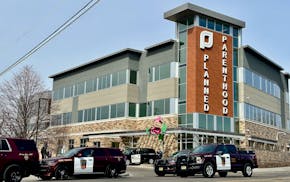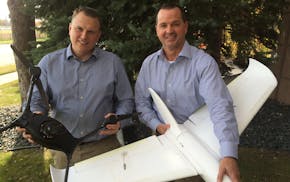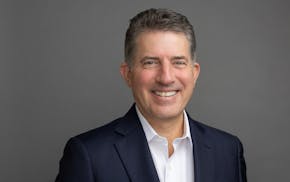Days after the protests, burning buildings, boarded-up businesses and curfews, a dozen mostly white and mostly male executives at Medica met for their regular Thursday meeting with the chief executive.
The global outrage over the May 25 death of George Floyd by Minneapolis police rattled them. It had been more than a year since leaders at the Minnetonka-based health insurer had pledged to make diversity a priority. Yet they still hadn't hired anyone to lead the effort. They looked at each other, and at their suburban-centric workforce, and admitted that not much had changed.
"It was really a wake-up call to many of us in the organization," said Geoff Bartsh, a senior vice president and 20-year veteran with the health plan. "That while we were making this a focus and priority, were we really making it a focus and priority?"
"Why don't we do more than write a check?" Rob Geyer, chief operations officer, said he told his colleagues. "Let's do something meaningful and tangible."
What they decided on was jobs. Jobs in an area of high unemployment and diversity. It would be a swift and steep learning curve for a company that has been anchored in the suburbs since 1968.
Eight months since Geyer threw down the challenge, Medica has hired a diversity chief and is about to put a new call center and claims processing operation in St. Paul's Midway area, where it will hire 50 people.
"You put a job somewhere, it benefits the person because they have economics," Geyer said. "But it has a multiplier effect on the community."
The idea moved to reality in near-record time by corporate standards. Medica Chief Executive John Naylor gave his full support to the Midway office, holding leaders to weekly progress reports. More than 1,000 employee hours went into the effort.
The company did many things differently. It met with community groups who understand poverty, underemployment and neighborhoods where people of different races, ethnicities and life experiences live.
While Medica traditionally turns to temporary agencies when it ramps up hiring each January to handle the busy open-enrollment period, it committed to hiring full-time workers for the Midway office and to prioritize jobs to workers who live in the five ZIP codes surrounding the office.
It hired female- and minority-owned building contractors to help prepare the new office in St. Paul, which will occupy a 7,000 square-foot space in the Wilder Foundation building.
Bartsh, who has lived in St. Paul for two decades, said he brought a deeper understanding of racism to his work on the Midway office project.
"My inability to be a direct part of the solution," he said, "led me to be a direct part of the problem."
He understands the business case for having a diverse workforce, for investing in training good workers without regard to race or class. And as longtime leader of the nonprofit health plan, he knows well the persistent disparities in health care and health insurance coverage for people of color.
Bartsh said that for him and his colleagues, this racial reckoning merged with their professional ambitions.
"The question was more: 'Is it enough what we're doing to help understand the issues of discrimination, inequity, systemic racism?' And collectively we said, 'No. We're not doing enough.' "
Medica worked with Greater MSP to find a location that was close to public transportation and in a neighborhood that could benefit from business investment. The Wilder Foundation, a nonprofit health and human services organization, was a good corporate fit. Plus its modern building with large windows could easily support Medica's technology needs.
The building sits near the corner of the Lexington Parkway and the University Avenue commercial corridor, which experienced miles of damage during the unrest after Floyd's killing.
"This is a model we've been working on in the region, and a way that we'd like for economic development to be done in the future," said Channon Lemon of the St. Paul Area Chamber of Commerce, who was part of a broad effort to woo Medica to the spot.
The proposal included input from Ramsey County Workforce Solutions, RealTime Talent, the Midway Chamber of Commerce, the city of St. Paul and the Metropolitan Council.
"This is a tremendous example of an organization intentionally locating to provide jobs and access and opportunity," Lemon said, "and to establish a footprint and build relationships with new talent — and potentially new customers."
Though Medica's employees are working remotely until the coronavirus threat has abated, hiring for the claims processors and call-center workers has begun. The first wave started work in January, and Medica expects to have all jobs filled by mid-March.
The jobs have a total compensation of $55,000 to $70,000 a year including pay and benefits, which include health and dental insurance, a matching 401(k) retirement plan and tuition assistance. Medica expects to spend $2 million a year on the St. Paul workforce.
Medica leaders said the long-term goal is not just to hire for the Midway office, or to turn it into some urban outpost of diversity. They argue that the jobs, while entry level at about $17.50 an hour, will provide better opportunities within the company or give workers skills to find better jobs.
More than a third of Medica employees hired for call-center positions over the past five years have been promoted, the company said. Eight current directors, senior directors or managers began their careers as call-center representatives.
The Midway office project was underway before Alex Tittle began his job Medica's first senior director of diversity, equity and inclusion in early October.
Though he has yet to relocate to the Twin Cities, Tittle has worked in the past with numerous Minnesota companies and municipalities focused on diversity and civil rights and has helped connect the company with city leaders and community groups.
Along the way to opening the office, Medica has met with leaders at such organizations as Hallie Q. Brown, Ujamaa Place, the African Immigrants Professional Development Conference and Project for Pride in Living.
Tittle said he believes the connections now will benefit the entire enterprise and solidify Medica's long-term stake.
"These are intentional efforts that are hopefully going to make us a true resident and partner and neighbor of the community in the east metro," Tittle said. "But that doesn't happen overnight."

Planned Parenthood North Central States to lay off 66 workers, restructure presence in Minnesota

John Deere buys St. Paul precision ag company Sentera
New virus is wiping out Minnesota turkey flocks, costing farmers $112M so far

Part of the family for 75 years, 19th-century house near Lake Minnetonka listed at $2M

